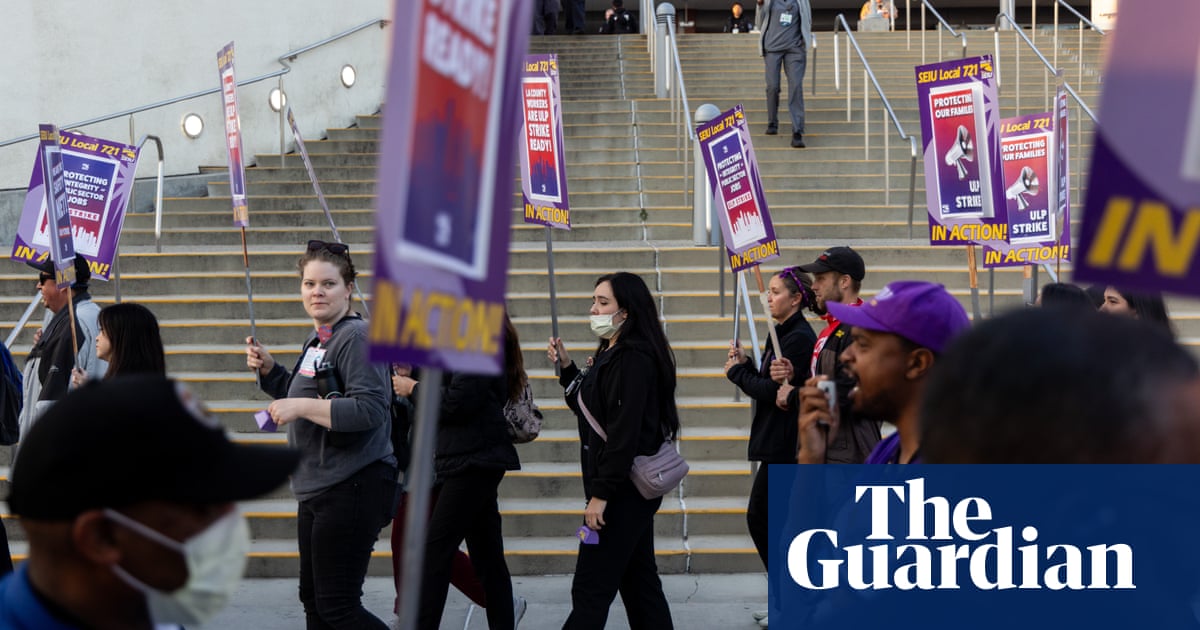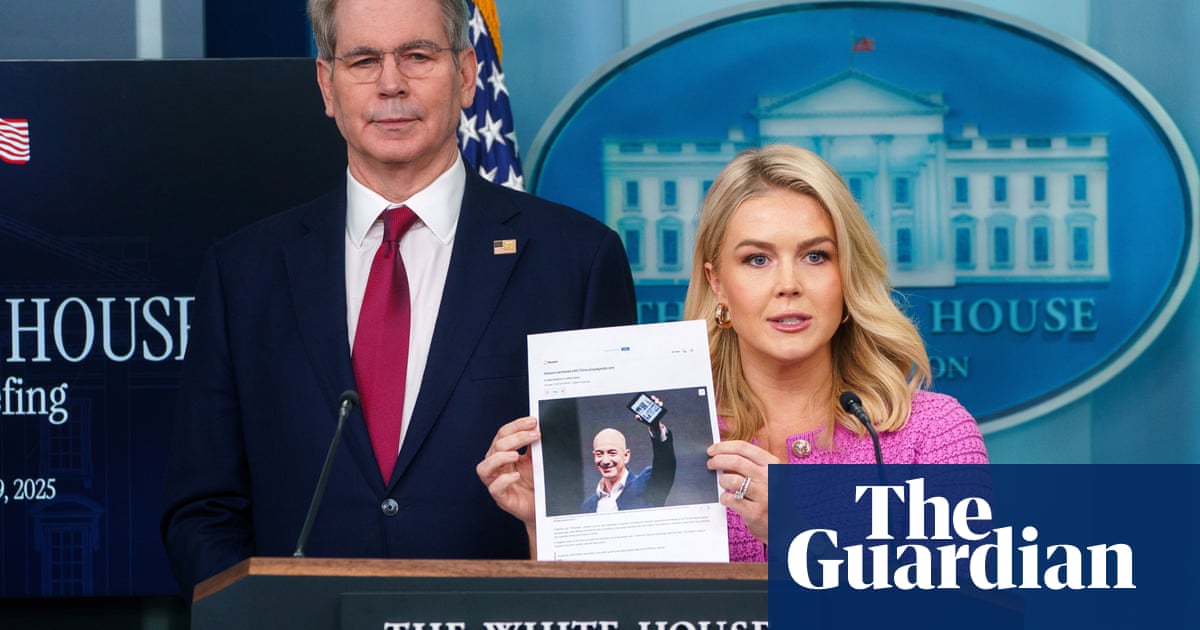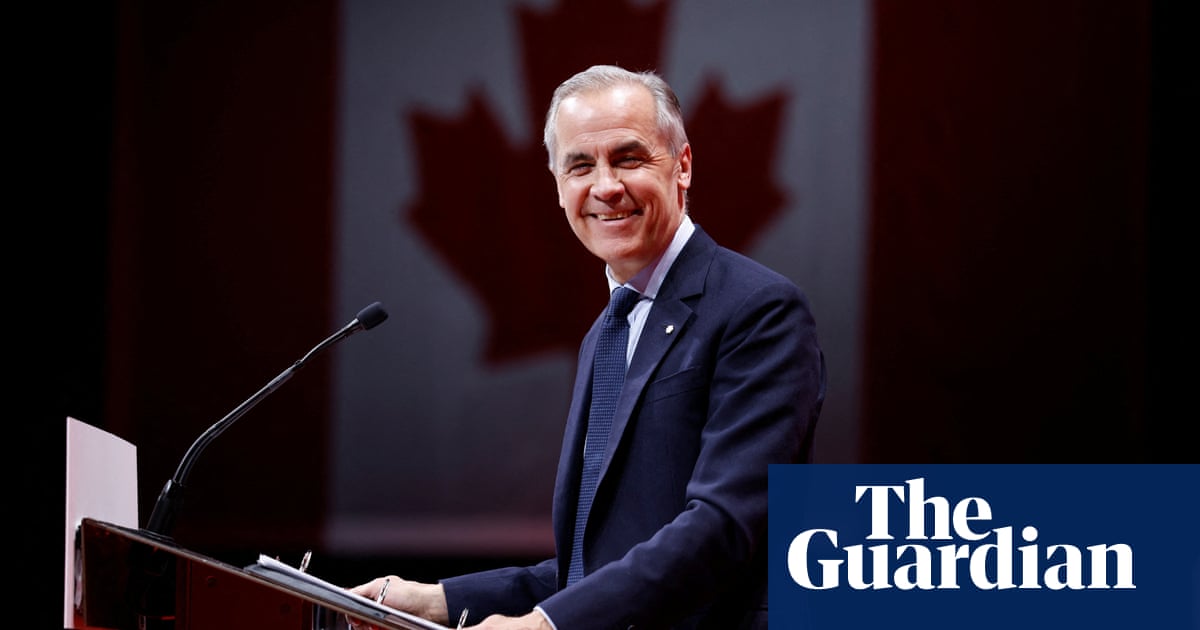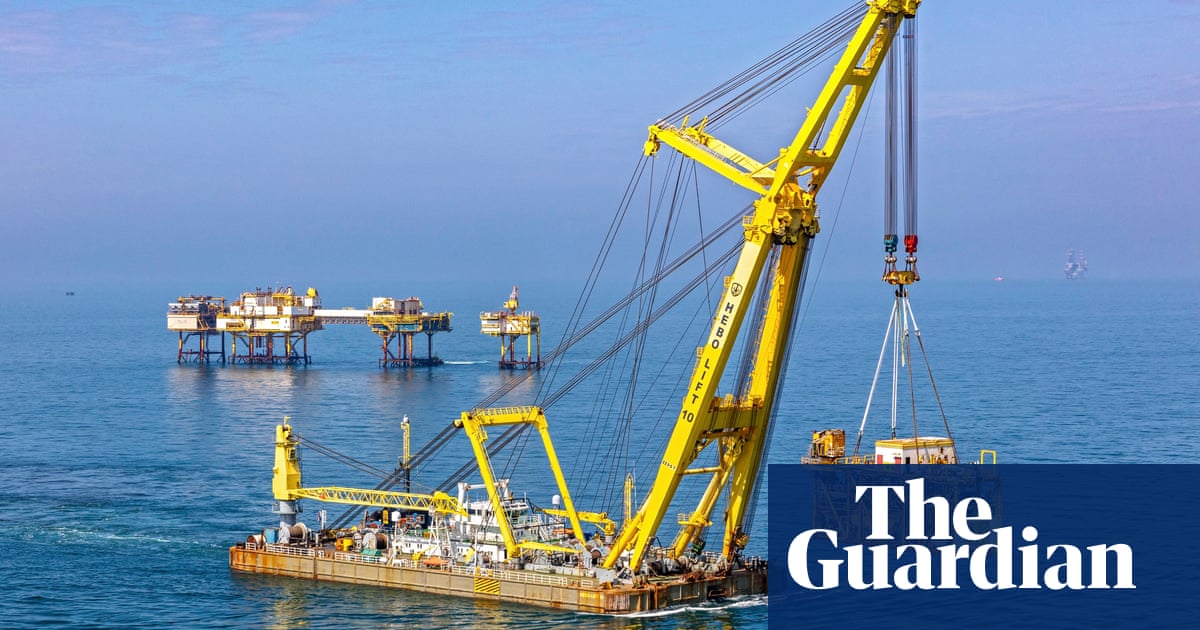Blair calls for 'reset' in net zero policy, saying voters won't make sacrifices if they think impact on emissions minimal

Jessica Elgot
Jessica Elgot is the Guardian’s deputy political editor.
Tony Blair has called for a “reset” of action on climate change, to the dismay of some green campaigners, suggesting the government should focus less on renewables and more on technological solutions like carbon capture.
In remarks that have antagonised some in Labour and in industry, the former prime minister said people were “being asked to make financial sacrifices and changes in lifestyle when they know that their impact on global emissions is minimal”.
Blair, who was writing the forward to a new report from his thinktank, the Tony Blair Institute, echoed similar criticism of net zero made by the Conservative leader Kemi Badenoch. He wrote “any strategy based on either ‘phasing out’ fossil fuels in the short term or limiting consumption is a strategy doomed to fail.”
The former Labour leader, whose institute has been highly influential in Labour circles, said that the current climate debate was “riven with irrationality” and suggested net zero was losing public support.
The paper itself, written by the TBI’s Lindy Fursman, said that net zero policies were now being seen as “increasingly viewed as unaffordable, ineffective, or politically toxic”.
In the UK however, climate change policies have retained popularity. The thinktank Persuasion UK said in a report published yesterday that Labour could potentially lose far more seats from disillusioned leftwing Labour voters defecting to the Greens than from those defecting to Reform.
Last week Keir Starmer told conference in London that tackling the climate crisis and bolstering energy security were “in the DNA of my government” and that “we won’t wait – we will accelerate.”
But Blair said that present policy solutions were “inadequate” and said leaders should shift towards a “pragmatic policy” that prioritised technological solutions. He said this was borne out by rising demand for production of fossil fuels, especially in China and India and the doubling of airline travel plus increased demand for steel and cement.
He said he still believed climate was “one of the fundamental challenges of our time” and that renewable energy was necessary. But he said the government needs “to alter where we put our focus”.
Blair said there should be more focus on carbon capture, saying: “The disdain for this technology in favour of the purist solution of stopping fossil-fuel production is totally misguided.” He also called for a major new international embrace of nuclear power and to intensify work on new small modular reactors.
Key events Show key events only Please turn on JavaScript to use this feature
Sarwar calls Benjamin Netanyahu 'war criminal' - but accepts he was elected after appearing to call him 'despot' too

Severin Carrell
Severin Carrell is the Guardian’s Scotland editor.
Anas Sarwar, the Scottish Labour leader, appeared to describe the Israeli leader Benjamin Netanyahu as a “despot” before rowing back after being asked whether he believed that was accurate.
Sarwar began ad libbing as he delivered a speech to the Scottish TUC’s annual congress in Dundee about wars and violence around the world, when he paid tribute to:
Those struggling in Gaza and the humanitarian catastrophe that continues and the ongoing bloodshed from a regime led by Benjamin Netanyahu that doesn’t seem to understand or respect international law.
Or whether it be those suffering in Ukraine at the hands of another despot in the name of Vladimir Putin, or indeed those that are suffering in the ongoing violence in Sudan, and the many, many other places where there are heightened tensions or the risk of war.
Speaking to reporters after his speech, Sarwar qualified those remarks. He said:
I talked about despotic regimes in Russia. Benjamin Netanyahu is a democratically elected prime minister.
I believe Benjamin Netanyahu is a war criminal. I believe he is flouting international law in his actions in Gaza, but he is a democratic elected prime minister of Israel.
Asked if he misspoke, Sarwar added:
Well I called Vladimir Putin a despotic regime and leader. Our challenge, if we are going to see a peaceful resolution in the Middle East [is] yes, we have to see the end of violence.
Yes, we have to see a ceasefire. Yes, we have to see the immediate release of hostages, but we also have to see a change in the political circumstances in the Middle East, because ultimately, we need two sides that are willing to negotiate and willing to come to a peaceful resolution and a two-state solution.
At the moment, I don’t get an impression that that’s a position that Benjamin Netanyahu supports, and that’s why he continues to flout international law; continues to starve the people of Gaza in many ways, continues the bloodshed of innocent individuals, and that’s why, I think it demonstrates we need a different approach.
The International Criminal Court has issued an arrest warrant for Netanyahu over war crime allegations. Israel does not accept these charges.
Blair calls for 'reset' in net zero policy, saying voters won't make sacrifices if they think impact on emissions minimal

Jessica Elgot
Jessica Elgot is the Guardian’s deputy political editor.
Tony Blair has called for a “reset” of action on climate change, to the dismay of some green campaigners, suggesting the government should focus less on renewables and more on technological solutions like carbon capture.
In remarks that have antagonised some in Labour and in industry, the former prime minister said people were “being asked to make financial sacrifices and changes in lifestyle when they know that their impact on global emissions is minimal”.
Blair, who was writing the forward to a new report from his thinktank, the Tony Blair Institute, echoed similar criticism of net zero made by the Conservative leader Kemi Badenoch. He wrote “any strategy based on either ‘phasing out’ fossil fuels in the short term or limiting consumption is a strategy doomed to fail.”
The former Labour leader, whose institute has been highly influential in Labour circles, said that the current climate debate was “riven with irrationality” and suggested net zero was losing public support.
The paper itself, written by the TBI’s Lindy Fursman, said that net zero policies were now being seen as “increasingly viewed as unaffordable, ineffective, or politically toxic”.
In the UK however, climate change policies have retained popularity. The thinktank Persuasion UK said in a report published yesterday that Labour could potentially lose far more seats from disillusioned leftwing Labour voters defecting to the Greens than from those defecting to Reform.
Last week Keir Starmer told conference in London that tackling the climate crisis and bolstering energy security were “in the DNA of my government” and that “we won’t wait – we will accelerate.”
But Blair said that present policy solutions were “inadequate” and said leaders should shift towards a “pragmatic policy” that prioritised technological solutions. He said this was borne out by rising demand for production of fossil fuels, especially in China and India and the doubling of airline travel plus increased demand for steel and cement.
He said he still believed climate was “one of the fundamental challenges of our time” and that renewable energy was necessary. But he said the government needs “to alter where we put our focus”.
Blair said there should be more focus on carbon capture, saying: “The disdain for this technology in favour of the purist solution of stopping fossil-fuel production is totally misguided.” He also called for a major new international embrace of nuclear power and to intensify work on new small modular reactors.
Badenoch says being unpopular is stage for Tories that 'has to be got through', as she rules out resigning if election results bad
Voters are “tired” of the Conservative party changing leader, Kemi Badenoch has said.
In an interview with Matt Chorley for Radio 5 Live, being broadcast from 2pm today, Badenoch made the argument as she ruled out resigning however bad the results of the local elections are for her party.
In an interview this morning Badenoch said that a bad result would not be her fault. (See 9.23am.) Expanding on that argument, asked if she would consider resigning in the event of a terrible result, she replied:
No, because this is something that we have said has to be got through. We’ve got to get through this initial period where the public rejected Conservatism. Last year, they voted whatever they could to get Conservatives out. We have a job to do to fix the brand.
Anyone who thinks that this is an overnight task and that changing leader yet again is the solution is not paying attention. The public are quite tired of watching us change leader.
In her interview Badenoch also said she would like to see a statue of Margaret Thatcher erected in Parliament Square.
And she slightly revised her view on sandwiches. Last year she made the headlines when she said did not like them because they weren’t “real food”. Today she said would be make an exception “if a sandwich makes an effort, you know – like a burger”.
Sarwar urges Scottish trade unionists not to abandon faith in Labour

Severin Carrell
Severin Carrell is the Guardian’s Scotland editor.
Anas Sarwar, the Scottish Labour leader, has appeared to plead with Scottish trade unionists to continue supporting Labour, urging them to “never forget” only his party could deliver the rights and reforms they wanted.
In an at times awkward speech to this year’s Scottish TUC congress in Dundee, often speaking off script, Sarwar framed the UK government’s policies on workers’ rights, the take-over of British Steel, the increase in minimum pay and a £200m investment offer for Grangemouth as ones designed by Labour in alliance with trade unions.
Those policies, he said, were “only possible because this labour movement helped elect a Labour government”.
The alternative was the chaos and regressive attacks on the poorest from the Conservatives, he said, before switching gear to implicitly warn delegates rejecting Labour would be counterproductive. Trade unionists had a “duty” to back the party, he said.
Now not everyone in this room will agree with every action of a Labour government, but people in this room will understand that you only get to make different decisions if you have a Labour government.
And of course, people in this room have a duty to hold a Labour government to account, but they also have a duty to work with a Labour government to make sure they advancing the cause of working people and that is the fundamental role of our trade union movement.
Facing a steep decline in polling support since the general election, Sarwar and senior Scottish Labour figures are making conspicuous efforts to court business leaders and investors, shifting the party into centrist, business-friendly territory.
But addressing the STUC, he often used the word “we” to suggest Labour and the union movement were one, pledging Labour “will put high skill, high pay, unionised jobs workers here in Scotland first”, with trade unionists helping to write the party’s 2026 manifesto.
Delegates largely sat stoney-faced and undemonstrative as he spoke, many listening with their arms folded, before giving his speech polite applause – a muted response experienced by John Swinney, the first minister and Scottish National party leader, on Monday.

MCB criticises Labour for not doing more to prevent 'slaughter' of Palestinians, highlighting contrast with Ukraine policy

Ben Quinn
Ben Quinn is a senior Guardian reporter.
Keir Starmer is being urged today to end UK arms exports to Israel and recognise an independent state of Palestine, in a letter signed by hundreds of organisations ranging from campaign groups to Islamic societies and mosques.
The letter, which is being hand delivered today to Downing Street by the Muslim Council of Britain, the UK’s largest Muslim umbrella group, with more than 500 affiliated members including mosques, schools and charitable associations, comes as a reminder of the continuing political pressure on Labour over Gaza in the week of local and mayoral elections. It says:
For the past 18 months, we have seen the indiscriminate slaughter of Palestinians daily and found very little support from the government to take practical steps to prevent this.
What makes this much worse is the direct comparison with how Ukraine is being supported against Russian aggression.
Although the two conflicts have their unique features, the Palestinian civilians being killed in their tens of thousands are no less human and no less deserving of the right to self-determination and safety.
The letter calls for the facilitation of immediate humanitarian aid to Gaza, a cessation of UK arms exports to the Israeli government and the return of all hostages, “including Palestinian prisoners, especially women and children held without trial for years on end”.
Successive UK governments have, for more than a decade, had a policy of “non-engagement” with the MCB, based on claims that the organisation is not sufficiently representative of the muslim community and that allegations that senior figures endorsed extremist positions in the past.
Labour’s vote share among British Muslims fell significantly between 2019 and 2024 amid anger in some communities over the party’s stance on Gaza.
Starmer not expected to campaign in Hamilton byelection in Scotland, just as he's missed Runcorn, says Anas Sarwar

Severin Carrell
Severin Carrell is the Guardian’s Scotland editor.
Keir Starmer is not expected to campaign in the Hamilton byelection, a critical contest for Scottish Labour which takes place in early June, Anas Sarwar has confirmed.
The Scottish Labour leader said Starmer is “understandably focused on the huge challenge we face around national security, [and] around delivering the programme of a UK Labour government.” Speaking at the Scottish TUC conference in Dundee, he said:
I wouldn’t expect Keir to be campaigning in the byelection. That’s not to say he won’t, but I’m not expecting Kier to campaign in the byelection.
The prime minister was not campaigning in the Westminster byelection in Runcorn, for the same reason, Sarwar said. Some pundits expect Nigel Farage, the Reform UK leader, to campaign in Hamilton, adding to Scottish Labour’s discomfort.
Labour’s standing in Scotland has plummeted since the UK government began cutting winter fuel benefits, raising national insurance costs and Starmer’s expenses row, with its support as low as 19% in Holyrood polling.
That makes the Scottish National party favourite to retain the Holyrood seat Hamilton, Larkhall and Stonehouse on 5 June, left vacant by the sudden death of the SNP incumbent, Christina McKelvie.
In striking contrast, Labour humiliated the SNP in the byelection contest for the adjacent Westminster seat of Rutherglen and Hamilton West in October 2023, greatly lifting Sarwar’s confidence that Labour could defeat the SNP in next year’s Holyrood elections.
Sarwar insists he remains confident of victory next year.
I’ll be on the stump campaigning for a Labour win. I’m the candidate for first minister next year. I’m the one that wants to remove the SNP from government.
Next year, we’ve got to demonstrate to people that for all Nigel Farage might want to come here with his easy answers and create a bit of a circus, the reality is a vote for Reform only helps the SNP. If you want to get rid of the SNP, only Scottish Labour can beat them.

There are two urgent questions in the Commons today after 12.30pm, on the terrorism attack in Kashmir and on the ‘kill MP’ comment from the Irish band Kneecap, followed by a ministerial statement on the visit yesterday by Mohammad Mustafa, prime minister of the Palestinian authority.
UK’s first trans judge appeals to European court of human rights over supreme court ruling
Britain’s first transgender judge is taking the UK to the European court of human rights over the supreme court’s ruling on biological sex, Libby Brooks reports.
Who is expected to win Runcorn and Helsby byelection?
Labour is saying that the Tories have “gifted” the Runcorn and Helsby byelection to Reform UK. (See 9.23am) But a win for Nigel Farage’s party is not inevitable.
There have been two polls in the constituency. Lord Ashcroft published one more than a month ago suggesting that Reform was likely to beat Labour by 40% to 35%, weighted by likelihood to vote. A few days later Find Out Now published one suggesting Reform was ahead by three points (36%, to Labour’s 33%).
Byelection polls are less reliable than national polls, which are always a useful guide to voting trends, but not always a reliable predictor of results. However, betting companies also expect Reform to win.
And yet – it is not all lost for Labour. Ben Walker, the New Statesman data expert who co-founded the Britain Elects website, runs an election forecasting model, Britain Predicts, which outperformed all other models at the 2024 election. He has crunched the numbers and, in a report yesterday, he said his model currently has Labour beating Reform by 36% to 35%.
But there is a lot of uncertainty, he says.
Reform is banking on voters with an unreliable history of voting. The polls put them on top right now, in part because some traditional voters will stay home (Labour looks like “more of the same” than “a real change” as More in Common polling finds); and in part because traditional non-voters are psyched up by Farage. The problem for the conventional parties is these new non-voters lean Reform. On the voter sheets they are often written off as not voting.
This polling is backed up in part by council by-elections. But in a high risk game of constituency contest, it’s a reliance on the unreliable.
Walker, who lives just outside the constituency, also says some Tories may vote Labour to keep Reform out.
Nationally, Tory voters in Labour vs Reform fights tend to lean Reform. But when you control for affluence it isn’t so simple. Rich Conservative voters are more split on the question. I hear of former Conservative councillors in the locale conceding that they will vote Labour for the first time. It makes sense for Labour to give the strategy a go.
UPDATE: Tom Baldwin, a former Labour spin doctor, told a similar story in his Times column yesterday. He said:
Labour’s strategists believe that they can lure such progressive or centrist deserters back into the fold if there is a real prospect of Reform or the Tories winning. The Runcorn byelection represents a first test of this. And, up to a point, such tactical voting might come into play. For instance, when I walked around one of the constituency’s more well-to-do areas last week, a woman told me she was backing Labour for the first time because of what the reputational damage of having a Reform MP “might mean for our property prices”.
Wales not on target to meet health, climate and nature goals, says its future generations commissioner

Steven Morris
Steven Morris is a Guardian reporter covering the west of England and Wales.
The future generations commissioner for Wales, Derek Walker, has warned that the country is not on target to meet health, climate and nature goals.
Walker is leading a future generations action summit at the National Museum Cardiff, which marks the 10th anniversary of the Future Generations Act, which was a world first.
He has produced 50 recommendations on climate and nature, culture and the Welsh language, the well-being economy and health that he says are needed to protect, support and make life better for future generations.
Walker said:
Wales has led the way for the past 10 years with our collective vision for a Cymru that’s protecting future generations, but we’re not on target to meet our health, climate and nature goals that will get us there.
Future generations will live with the consequences of every decision we take to improve people’s lives. We have to work fast to scale up the good examples of change, and create more benefits for everybody as we decarbonise, restore nature, improve public health and create local jobs and an economy that works for people and planet.
His recommendations include:
-
A target in law for nature’s recovery, with a clear plan of action and long-term funding arrangements.
-
More involvement of people in shaping policies and building trust, including via action like a Community Right to Buy Act to empower communities to take ownership of valued local buildings, land, and community assets, such as theatres and wind farms.
-
A long-term plan to improve Wales’ food security and ensure equal access to local, affordable, healthy and sustainable diets.
-
Annual ringfenced prevention budgets and a move towards long-term funding arrangements to safeguard people’s long-term needs.
-
A real living wage plan by every public body within two years, as a critical step to tackle poverty.
Under the Future Generations Act, the commissioner is appointed to challenge the Welsh government “to make decisions in the best interests of people who aren’t born yet”.
Badenoch suggests Tories would oppose plans to extend sugar tax, saying she was opposed when her party first introduced it
This morning the Times has splashed on the news that ministers are planning to extend the suger tax. In their story, Max Kendix and Chris Smyth say:
Milkshakes and lattes are set to be hit by a sugar tax for the first time as Labour moves to extend the levy to hundreds more soft drinks including Pepsi and Ribena.
Pre-packaged milkshakes and coffees will be covered by the levy, ministers signalled on Monday, ending an exemption they described as an anomaly. The present laws have mainly affected fizzy drinks.
In a move that goes further than expected, ministers said it was time to be more ambitious on unhealthy drinks, announcing that they will also lower the sugar content threshold at which the tax applies, catching some of Britain’s best-known brands and supermarket products which had changed recipes to avoid the previous levy.
Tax rates on sugary drinks will also rise 27 per cent over the parliament to make up for a freeze since 2018, ministers confirmed.

Asked about this in her interview on BBC Breakfast, Kemi Badenoch said that she was not keen on the sugar tax anyway, even the original version introduced by her party. She said:
I wasn’t a fan of it when this law was brought in. It actually first came in under the Conservatives. I thought it was a bit too much nanny state.
But we have a sugar tax already. My worry is that the government doesn’t have any plans, didn’t have any strategy, and so they’re just looking for what else they can tax.
Taxing is not the way to get the economy growing. Just simply going back for more and more taxes at a time when businesses are closing down, they’re not hiring – Labour has been making the wrong choices on the economy across the border.
I don’t think that this is going to make much of an additional difference. I think the law of diminishing returns tends to apply when you keep just doing the same thing again and again and expecting outsized returns.

Readout from Starmer's meeting with Palestinian authority PM Mohammad Mustafa
On the subject of Gaza, I was asked yesterday if I could post the Downing Street readout of Keir Starmer’s talks yesterday afternoon with Mohammad Mustafa, prime minister of the Palestinian authority. Here it is. A No 10 spokesperson said:
The prime minister began by expressing his sincere condolences for the appalling loss of life in Gaza. He said that the UK does not support the resumption in hostilities, which are in nobody’s interests. He added that the UK will continue to press for a return to the ceasefire as a first step to a lasting peace, and reiterated that the return of humanitarian aid into Gaza is critical.
He also said that we must not lose sight of the situation in the West Bank, where unlawful settlement and violence is of deep concern.
Discussing the Arab Plan for Gaza, the prime minister shared the UK’s support for the Palestinian authority’s reform programme, which he said is critical. The leaders agreed that a strategic political framework will be necessary as part of the implementation of a two-state solution, and that Hamas must have no role in Gaza’s governance.
They both agreed that the UK would continue to work closely with the Palestinian authority and regional partners to find a constructive way forward, and deliver lasting peace and security for Israelis and Palestinians alike.
Kneecap apologise to families of murdered MPs over ‘dead Tory’ comments
Kneecap, the Irish language rap group from Belfast, have apologised to the families of murdered MPs David Amess and Jo Cox after footage emerged in which the Irish-language rappers purportedly call for politicians to be killed, Jamie Grierson reports.
Here is an extract from the Kneecap statement, which has been posted on Bluesky.
Let us be unequivocal: we do not, and have never, supported Hamas or Hezbollah. We condemn all attacks on civilians, always. It is never okay. We know this more than anyone, given our nation’s history.
We also reject any suggestion that we would seek to incite violence against any MP or individual. Ever. An extract of footage, deliberately taken out of all context, is now being exploited and weaponised, as if it were a call to action.
This distortion is not only absurd - it is a transparent effort to derail the real conversation.
All two million Palestinian people in Gaza are currently being starved to death by Israel.
At least 20,000 children in Gaza have been killed. The British government continues to supply arms to Israel, even after scores of NHS doctors warned Keir Starmer in August that children were being systematically executed with sniper shots to the head.
Yvette Cooper says UK focused on 'resilience', in response to questions about massive power cut in Spain and Portugal
Yvette Cooper, the home secretary, was doing a media round this morning to discuss the foreign sex offenders announcement. Asked about the power cuts in Spain and Portugal, and whether the UK could be affected in the same way, she told Sky News the UK has a “continued approach” to “resilience” and “security issues”. She said:
We’ve been looking, as part of wider security reviews across the country, how we deal with both resilience and also different kinds of challenges and threats.
Some of which can be the traditional security challenges, some of which can be the kinds of resilience – things that we’re talking about in Spain and Portugal – and we obviously support them and the governments there in the work that they’re doing.
Labour says Tories are ‘gifting' Runcorn byelection to Reform as Badenoch says bad result in elections won’t be down to her
Good morning. There are two days left until the local elections in England and, conveniently perhaps for Labour campaigners, the government’s main announcement is about a plan to stop sex offenders claiming asylum in the UK. Rajeev Syal has the details here.
The government is announcing this now because it will change the law via an amendment to the border security, asylum and immigration bill, which has already finished its committee stage in the Commons and will soon get its report stage (the last chance for an amendment before the bill goes to the Lords). Immigration policy is not a matter for local authorities, but Labour will still be hoping that today’s headlines might be at least marginally helpful as people think about how to vote.
With the Conservatives expected to lose around 500 council seats, according to one forecast, these should be difficult elections for Kemi Badenoch. But she won’t be taking it personally, she told BBC Breakfast this morning in an interview. Asked if a bad result would be a vote on her own “personal popularity as leader”, Badenoch replied:
No, I don’t. We had a historic defeat last year, and it’s going to take some time for us to get back on track. I am working to rebuild public trust, letting the country know that the Conservative party is under new leadership. But as we saw with previous oppositions, it took 14 years, 13 years and 18 years to come back. I’ve only been leader for six months. It’s going to take a while to fix the problems which we had from last year.
There is also a byelection on Thursday, in Runcorn and Helsby, where Labour had a majority of almost 15,000 at the last election. The constituency is counting overnight, which means that on Friday morning, when a lot of the local election results won’t yet be in (many councils count on the Friday, not overnight, because it is easier), the election night narrative will be determined largely by the Runcorn result. Reform UK hope they can win, and that would be a formidable show of strength (even though parties that pull off amazing byelection victories don’t normally perform so well at general elections). Given what has happened to the Westminster expectations thermometer, even a narrow Labour win would be a good result for Keir Starmer.
And the Conservatives? According to Labour, they have given up totally in the seat. This is what Ellie Reeves, Labour’s chair, told HuffPost UK.
The Tories aren’t doing anything. [Tory MP] Esther McVey basically said the Tories should sit it out and let Reform win, and we’re seeing that on the ground.
They’re not doing any work on the ground at all, it looks like they’re just gifting it to Reform.
Reeves, of course, has got an incentive to maximise the ‘Keep Reform out’ vote in Runcorn. But that does not mean she’s wrong, and it would be surprising if she is. The Tories wrote off their chances in this seat some time ago, and it would make sense for them to deploy campaign resources elsewhere.
Here is the agenda for the day.
9.30am: Keir Starmer chairs cabinet.
Morning: Ed Davey, the Lib Dem leader, is campaigning in East Anglia.
10am: Comedy industry figures, including the podcaster Matt Forde, give evidence to the Commons culture committee about the state of live comedy.
2.20pm: Jack Thorne, creater of the Netflix show Adolescence, and Emily Feller, its co-executive producer, give evidence to the Commons women and equalities committee on misogyny among young men and boys.
2.30pm: Andy Burnham, Greater Manchester mayor, and Kim McGuinness, North East mayor, give evidence to the Commons business committee about industrial strategy.
Afternoon: Kemi Badenoch is campaigning in the south-west of England.
Afternoon: Nigel Farage, the Reform UK leader, is campaigning in Scunthorpe with Andrea Jenkyns, the party’s candidate for Greater Lincolnshire mayor.
If you want to contact me, please post a message below the line when comments are open (normally between 10am and 3pm at the moment), or message me on social media. I can’t read all the messages BTL, but if you put “Andrew” in a message aimed at me, I am more likely to see it because I search for posts containing that word.
If you want to flag something up urgently, it is best to use social media. You can reach me on Bluesky at @andrewsparrowgdn.bsky.social. The Guardian has given up posting from its official accounts on X but individual Guardian journalists are there, I still have my account, and if you message me there at @AndrewSparrow, I will see it and respond if necessary.
I find it very helpful when readers point out mistakes, even minor typos. No error is too small to correct. And I find your questions very interesting too. I can’t promise to reply to them all, but I will try to reply to as many as I can, either BTL or sometimes in the blog.

 5 hours ago
6
5 hours ago
6













































